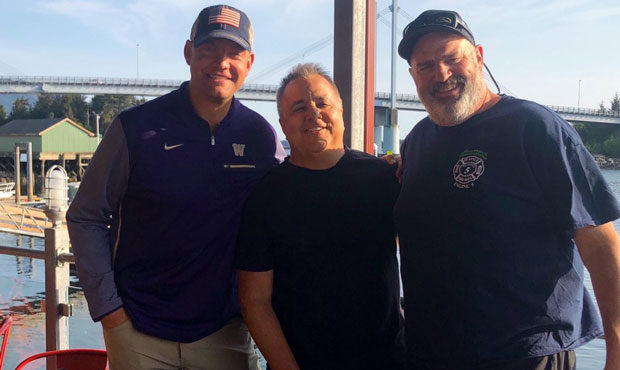Poulsbo neighbors fear for their children after sex offenders move in
Mar 4, 2019, 5:41 PM | Updated: Mar 5, 2019, 5:14 pm

The home of the four sexually violent predators, right, as viewed from the school bus stop 150 feet from the property line on Viking Way just outside Poulsbo. (Washington State for Public Safety)
(Washington State for Public Safety)
The Viking Way house sits on a grassy hill just outside of Poulsbo, overlooking a neighborhood and below that, the waters of Liberty Bay. It is by all definitions an idyllic spot.
And it’s now home to four court-defined sexually violent predators.
In the past year, the four civilly-committed sex offenders have been moved from the Special Commitment Center on McNeil Island to a home just outside of Poulsbo city limits — and terrified Kitsap County residents are fighting back.
The men were moved as part of what’s known as a Less Restrictive Alternative — a program for conditional release in which sex offenders who had been civilly committed on McNeil Island are given a measure of freedom by transitioning back into the community, while still being monitored by 24/7 staff (at a one-staff-member-per-predator ratio) and GPS tracking.
The Washington State Department of Social and Health Services contracted day-to-day operations of the LRA home to Westsound Support Services, LLC. Chris Wright, media relations manager for DSHS, said that the department typically contracts out LRA residences to save money and “ensure quality and delivery of services.”
After discovering in late November that the home was operating on Viking Way, a group of concerned Poulsbo-area residents formed the nonprofit Washington State for Public Safety. The group aims to use existing Kitsap County regulations to shut down the home, through litigation if necessary, and to work with the Legislature to stop this from happening in other communities around the state.
“This is totally, totally reshaping our community, emotionally and physically,” stated Pamela Benson, director of WSPS. “And it’s got to stop. It can’t happen in other communities.”
The sex offenders living on the Viking Way property — William Deaville, Elmer Todd Gillis, Kim Daly, and Michael Loyle — have histories of repeated sexual crimes going back decades, including many assaults on children. All four carried out their first known assaults by age 20.
Deaville told investigators and treatment providers that he had assaulted over 50 boys throughout his life. Loyle, after numerous previous convictions, was convicted of first-degree child rape in 1993 after repeatedly raping a then-7-year-old girl while babysitting her over the course of 20 months.
Gillis was previously granted an LRA, but was sent back to McNeil Island five months later when he violated its conditions.
Sexually violent predators in a family neighborhood
Chief among the concerns of WSPS members is the location of the house in a family-filled neighborhood. A North Kitsap school bus stop is located across the street from the home — about 150 feet away, according to a Washington State Department of Corrections report — and is clearly visible from the windows.
According to court documents, Daly admitted to investigators that he had watched children catching the school bus while fantasizing about them during a probation period in the past.
The property also borders a backyard where neighbor kids can be found playing on a sunny day.
“We have a young mother, with a toddler, whose backyard opens up onto the property,” Benson said.
The woman lives alone with her children, as her husband, who is in the Navy, is currently deployed. Now she lives in fear for her family.
WSPS legal liaison Becky Hoyt and her family live just steps from the property. Now what was once the comforting sanctuary of home has become a place of uncertainty and fear.
“I am a very concerned citizen; I have two small children,” Hoyt said, choking back sobs. “I can’t let my daughter play in her backyard.”
The sex offenders are allowed to visit local businesses, parks, and hiking trails while accompanied by a staff member carrying a cell phone, but no weapon. Benson wonders what would happen if a chaperone had a medical emergency while escorting a sex offender in a child-filled place.
There could even come a time when the sexually violent predators could go to shopping centers and parks un-chaperoned. According to Wright, any of the home’s residents could legally apply with the court and their transition team be allowed out and about on their own.
The SVPs wear GPS ankle monitors, but a Department of Corrections’ report acknowledges that these monitors do not always provide the most accurate location monitoring. The report noted that the trackers could not definitively show whether a sexually violent predator was inside a store, or even inside the group home itself.
According to the report, the inclusion zone of the tracker can be set between 600 and 300 feet. This is a radius that goes well beyond the bounds of the home, Benson said.
“The inclusion zone of the GPS tracker actually would allow them to enter the next-door neighbor’s house and be in their living room; they would be able to go down to the school bus stop,” Benson said. “And all of that would appear as if they were safely ensconced in the residence.”
Secure community transition facilities
Residents say that they received no prior notifications about the home, only finding out about their new neighbors after the fact.
WSPS sees the Viking Way house as a secure community transition facility, a type of strict housing reserved for sexually violent predators coming out of the commitment center. According to RCW 71.09, such a facility would require that government notifies the public through public hearings and notices in the newspaper, as stipulated in RCW 71.09.315.
“I would argue that the use of that property is a secure community transition facility,” Hoyt said. “And if so, why are they allowed to not follow the laws governing such a facility?”
WSPS believes that the home fits the descriptions outlined in RCW 71.09.250, RCW 71.09.300, RCW 71.09.305, and RCW 71.09.325, which mandate the constant presence of staff, GPS monitoring, and the reporting of release violations.
However, Wright said that according to DSHS, the house outside Poulsbo does not technically meet the legal definition of an SCTF, and noted that the state currently operates just two SCTFs.
“Unlike SCTFs, the home operated on Viking Way is not locked from the inside, although there are security cameras and alarms to monitor the entrances and exits,” Wright said.
While this house includes 24-hour staff just like a secure community transition facility, the main difference is the purpose of staff members.
“Aside from getting the residents to and from the appointments if required under the court order, these placements are also not required to provide or ensure the provision of sex offender treatment directly,” Wright said. “These contracted placements are designed for residents who need assistance with some of their activities of daily living. These residents may need help planning and cooking meals, assistance with scheduling appointments, budgeting money, and paying bills.”
Wright said that DSHS has been purposefully working to place LRA residents in Kitsap County.
“Part of the motivation was to develop LRA placements in Kitsap County, given that Kitsap County has more than a dozen sexually violent predators committed to the Special Commitment Center,” Wright said.
If these people are housed in a similar manner to the Viking Way home, then many Washingtonians could be in the dark about who is living nearby, WSPS fears. That is why the community is stepping up on behalf of the rest of the state.
“Hypothetically, this could be all over the state — people would not know, because there was no public notification requirement adhered to,” Hoyt said.
According to Hoyt, as of May 2018, 61 people were released from the SCC on McNeil Island and enrolled in the LRA program throughout Washington. Sex offenders are not always placed in the county where they committed their crimes, but instead can be moved based on placement availability.
However, a bill in the Legislature, Senate Bill 5941, would seek to keep sexually violent predators in their original counties whenever possible, and ensure that LRAs are not located within a quarter-mile of a school.
A community changed
Benson said that two more people are expected to be moved to a second home on the property in in the near future. She fears that as more sex offenders move into the area, home prices will drop and prompt a cycle of decline.
The 2014 report by the Washington State Office of Financial Management’s Sex Offender Policy Board stated that when there are multiple sex offenders in a community, there is a “sharp, 16-percent drop in the price of nearby homes.” Furthermore, the report stated that as property values drop, “clustering” of sex offender housing occurs.
“This is not NIMBY-ism,” Benson stated. “This should not be happening in any community. And if it is, it’s because the state is failing in its role of protecting law-abiding citizens.”
Critics online have accused WSPS of wanting the sex offenders to be homeless. Hoyt and Benson stressed that they want the men to be housed, but in a residence run by the state — not a private company — that is located outside of a neighborhood. Benson called the current facility akin to “a privately-run prison in a residential neighborhood.”
“We are not advocating for these men to be homeless, not in any way,” Hoyt said. “But these men are civilly committed by a court … we are just saying, ‘Hey, shouldn’t this be a state-run facility?'”
In the meantime, WSPS is working with Kitsap County commissioners, the county prosecutor, Poulsbo City Council members, and legislators in Olympia to shut down the Viking Way house and have the sexually violent predators moved to a state-run facility. Funds to help pay for WSPS’s legal counsel are being raised through a GoFundMe.
“This has totally impacted … the lives of the entire community. We have a unique corner of the world here in Poulsbo. We’ve all been working very hard to provide it and preserve our way of life, living in a small, secure community,” Benson said. “We’re secure knowing many of our neighbors. We shop in local businesses where we know people by name. We watch our children play in parks and on trails and run around, and they’re safe. And that serenity, that security, has disappeared.”
Westsound Support Services, LLC did not respond to a request for comment.













